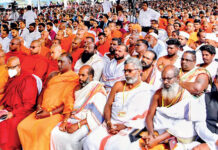By Mass L. Usuf
The protection of rights and violation of rights are two sides of the same coin and it takes a different dimension when the State is the violator. “The police and the armed forces must ‘respond’ and not ‘react’, and their response must be carried out within the framework of the law, as prescribed by law, and in a manner not exceeding the authority conferred on them by the law.” said, Justice Kodagoda addressing an event of the Human Rights Commission of Sri Lanka on 12th May 2023. Several adversarial acts by those in power which are normally considered wrong, becomes right, due to the manipulation of the law. This is how the politicians cunningly fight off or stifle dissenting political views and people’s clamour for justice and legitimacy. The politicians protect themselves under the refuge of the law.
Unlike in the United Kingdom where the Parliament is sovereign, our constitution states that sovereignty belongs to the people. In this background, to understand the web of juridical relationship between people’s sovereignty, fundamental rights and the State poses a legal challenge. The subtle deception seen in the Bill for an Anti-Terrorism Act (ATA) in furthering the spirit of its accursed precursor, the Prevention of Terrorism Act (PTA) raises the questions: (a) when and to what extent laws can restrict the freedom of citizens? and (b) the nature of one’s obligation to obey the law.
In the sphere of rights, there are two elements that need to be looked into (a) violation of a person’s bodily integrity and (b) violation of the rights of a person. They are two different areas but are intertwined. The violation of a person can extend from physical assault to the deprivation of exercising his conscience though the latter does not involve bodily harm. The violation of the rights of a person takes the form of depriving a person from his basic rights e.g. right to free speech, to protest, right to dissent, right to assembly and, so on.
All Things Being Equal
Restrictions on the right to exercise one’s freedom is often defended on the premise of, ‘national security’, ‘public order’ etc. as also seen in our constitution (Article 15). These are very good laws in order to minimise greater violence against other persons and property. However, there is an unwritten moral conditionality that is embedded in such laws and that is the principle of Ceteris Paribus (All things being equal). The gross violation of the economic, social, political rights of the citizens leading the country to bankruptcy is not consistent with the unwritten rationale of restriction of rights – all things are not equal. In these circumstances, to deprive legitimate dissent is a violation of both the person (integrity) and the rights of that person.
The Supreme Court of India in relation to interpretation of the law observed, “As it is a settled precept in the application of economic principles, that all other things will remain the same i.e., ceteris paribus, similarly, for the proper interpretation and examination of a provision of a statute, all bodies must be presumed to act effectively and in accordance with law.” K.B. Nagur M.D. (Ayu) vs Union of India on 24 February, 2012.
It is legitimate and, common sense, to assume that our Parliament when enacting such restrictions did so on the presumption that restrictions are applicable when everything is functioning in accordance with law and in keeping with standard norms and practices. Indisputably the government has violated the fundamental operative presumptions. It will be foolish to expect citizens to endlessly tolerate and put up with corrupt politicians and crony bureaucrats; Those who abuse the rule of law and make a mockery of the justice system.
Colombo telegraph



